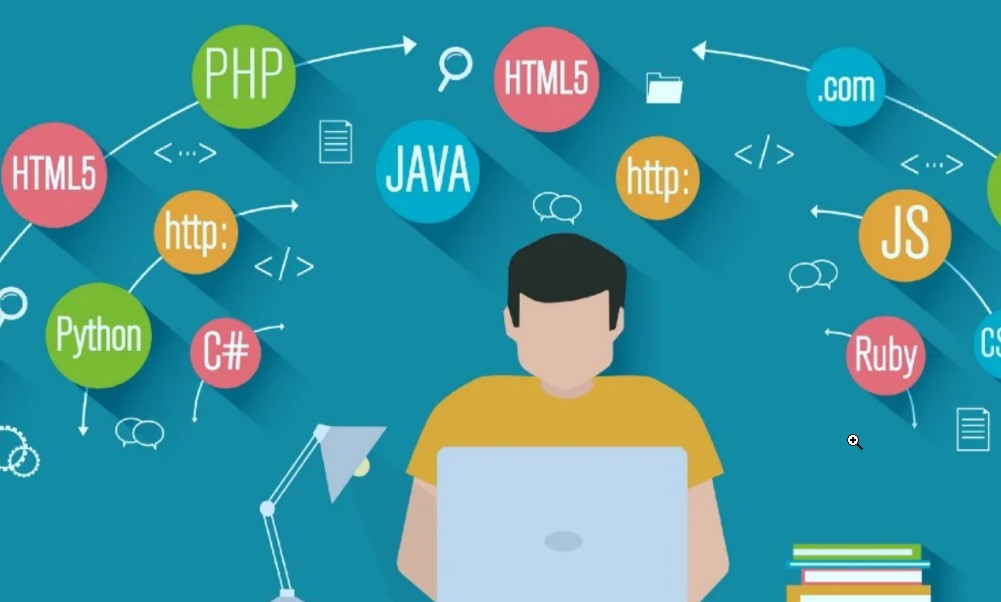Best Programming Languages to Learn in 2024
As we move further into the digital age, programming has evolved from being a specialized skill to a core competency for many industries. Whether you are an aspiring software engineer, a data scientist, or a product manager, knowing how to code opens up numerous opportunities. In this comprehensive guide, we’ll walk you through the best programming languages to learn in 2024.
Why Programming is a Critical Skill in 2024

Programming languages power nearly all modern technology, from mobile apps and websites to machine learning algorithms and video games. Understanding how to code allows you to create your own solutions, automate tasks, and develop applications that can make a real-world impact.
With an increasing demand for software in nearly every industry, developers are highly sought after. According to industry reports, the demand for software developers will continue to rise, with companies offering competitive salaries for those with the right skills. Moreover, programming also teaches problem-solving skills, critical thinking, and how to structure solutions logically.
In this guide, we will highlight five top programming languages you should consider, the platforms where you can learn them, and how they can boost your career prospects.
Benefit of Programming Languages to Learn

Learning programming languages offers numerous benefits that extend far beyond the ability to code. Whether you’re aiming for a career in tech or simply looking to expand your skill set, the advantages are vast and impactful. Below are some of the most significant benefits of learning programming languages in 2024.
1. High Demand and Job Opportunities
One of the most compelling reasons to learn programming is the growing demand for skilled developers. The tech industry continues to expand rapidly, and companies across various sectors are seeking individuals proficient in coding.
Careers in software development, data science, mobile app development, and artificial intelligence are not only plentiful but also high-paying. The U.S. Bureau of Labor Statistics predicts a 22% job growth for software developers by 2030, indicating the long-term viability of coding skills.
2. Versatility and Flexibility
Programming languages like Python, JavaScript, and Java are incredibly versatile, allowing you to work in various fields, from web development to data analytics and machine learning.
Python, for example, is widely used in both web development and data science, making it a great choice if you want to pivot between different tech roles. JavaScript is essential for building websites and is also used in mobile and desktop application development. The flexibility of these languages makes them valuable across industries.
3. Problem-Solving and Logical Thinking
Coding enhances problem-solving and critical thinking skills. When you learn to code, you are essentially learning how to break down complex problems into smaller, manageable tasks.
This process, called algorithmic thinking, is a transferable skill that benefits you in everyday decision-making and other professional fields. By writing and debugging code, you learn how to approach challenges methodically and find efficient solutions.
4. Opportunities for Innovation and Creativity
Programming opens up doors to innovation. Whether you’re creating mobile apps, building websites, or developing algorithms, coding enables you to turn your ideas into real, functional products. With languages like Swift or Java, you can create mobile apps for iOS and Android, contributing to the booming app economy.
As you learn, you’ll also have the opportunity to contribute to open-source projects, potentially collaborating with a global community of developers.
5. Financial Independence and Freelance Opportunities
Programming allows you to work on freelance projects or create your own tech products. Many developers build their own startups, while others take on freelance clients to create websites, apps, or automation tools. Coding skills can provide you with financial independence and flexibility in your career.
Top 5 Programming Languages to Lear

Here are the best programming languages to learn in 2024, considering their demand in the job market, versatility, and use cases across various industries.
1. Python
Python has consistently ranked as one of the most popular programming languages due to its versatility, ease of learning, and wide range of applications. Whether yo want to get into web development, data science, or machine learning, Python is an excellent choice. Python is a high-level, interpreted language with a simple syntax that makes it accessible even for beginners.
Key Benefits:
- Easy to Learn: Python’s syntax is simple and close to human language, making it a great first language for beginners.
- Versatile: From building websites to analyzing data and automating tasks, Python is a multi-purpose language.
- Active Community: With millions of developers worldwide, Python has an extensive community, meaning you’ll find plenty of resources, libraries, and frameworks.
Real-World Example: Python Bootcamp
This Python Bootcamp on Udemy is one of the most comprehensive courses available for beginners. It covers everything from the basics of Python to advanced topics like data science and machine learning. With more than 24 hours of content, this course ensures you’ll have a solid grasp of Python fundamentals.
Use Case: Python is commonly used in data science, web development, and automation. Many companies, including Google, Netflix, and NASA, use Python for backend development, data analysis, and building machine learning models. For instance, the backend of YouTube is developed using Python, showcasing its scalability and robustness.
2. JavaScript
JavaScript is the backbone of web development. It is a high-level programming language that is primarily used to create interactive websites. If you are interested in web development, learning JavaScript is non-negotiable. Beyond front-end development, JavaScript is also widely used in server-side programming with frameworks like Node.js.
Key Benefits:
- Cross-Platform: JavaScript can run on both the client and server sides, making it a powerful tool for full-stack development.
- Rich Ecosystem: There are countless libraries and frameworks (e.g., React, Angular, Vue) that make JavaScript development faster and easier.
- High Demand: JavaScript developers are in high demand as businesses increasingly rely on web applications.
Real-World Example: JavaScript Specialization
This JavaScript course on Coursera offers in-depth knowledge on front-end and full-stack development. With hands-on projects and real-world applications, this course ensures that you can build dynamic, responsive websites and web applications.
Use Case: JavaScript is widely used for creating interactive websites and mobile apps. Facebook, for example, uses React (a JavaScript library) for building its user interface. Other major platforms like Netflix and LinkedIn also rely heavily on JavaScript for front-end development.
3. Java
Java has been around for over two decades, but its importance in the tech world has not diminished. It’s a go-to language for building large-scale enterprise applications and is extensively used in Android app development. Java’s versatility and stability make it a popular choice for developers and businesses alike.
Key Benefits:
- Platform Independence: Because Java supports the Java Virtual Machine (JVM), code written in Java can execute on any device. This is why Java is recognized for its “write once, run anywhere” concept.
- Highly Scalable: Java is used by large enterprises for building highly scalable applications, from financial software to e-commerce platforms.
- Strong Community: With over 9 million developers worldwide, Java has a strong community that continuously contributes to its development.
Real-World Example: Java Programming Masterclass
This course covers everything from the basics of Java to more advanced concepts like data structures, algorithms, and object-oriented programming. It’s perfect for anyone looking to build Android applications or enterprise-level software.
Use Case: Java is widely used in large-scale enterprise applications, such as banking systems, e-commerce platforms, and Android apps. Companies like Airbnb, Uber, and Amazon utilize Java to manage the backend of their complex systems.
4. C++
C++ is an extension of the C language and is known for its speed and efficiency. It is commonly used in performance-critical applications like game development, systems programming, and software that interacts closely with hardware. C++ is a complex language, but it offers more control over system resources than most high-level languages.
Key Benefits:
- High Performance: C++ is known for its fast execution, making it ideal for performance-critical applications.
- Memory Management: C++ allows developers to directly manage memory, giving them greater control over system resources.
- Wide Range of Applications: From game development to embedded systems, C++ is versatile and powerful.
Real-World Example: C++ Programming Course
This course provides a solid foundation in C++ and is designed for developers looking to work in game development or performance-critical applications. It covers advanced topics like memory management and object-oriented programming.
Use Case: C++ is extensively used in game development, with popular engines like Unreal Engine being written in C++. It is also used in embedded systems and performance-oriented applications such as operating systems and browsers. For example, Google Chrome’s backend is built using C++ for speed and efficiency.
5. Swift
Swift is the preferred language for developing iOS and macOS applications. Developed by Apple, Swift is fast, efficient, and designed to be user-friendly. With the increasing popularity of mobile apps, Swift has become a critical language for developers looking to build for iOS.
Key Benefits:
- Optimized for iOS: Swift is specifically designed to build apps for Apple’s iOS and macOS platforms, offering better performance and integration with Apple’s ecosystem.
- Easy to Read and Write: Swift’s syntax is clean and easy to understand, making it an excellent choice for beginners.
- Speed: Swift is optimized for performance, making it much faster than Objective-C, the language it replaced.
Real-World Example: Swift Bootcamp
This Swift bootcamp is perfect for anyone looking to dive into iOS app development. It covers everything from the basics of Swift programming to building fully functional iOS applications.
Use Case: Swift is the go-to language for iOS development. Major companies like Uber, Slack, and Airbnb use Swift to build their iOS apps, leveraging the language’s performance and simplicity. If you’re aiming to create mobile apps for the Apple ecosystem, Swift is a must-learn language.
Product Comparison Table
| Programming Language | Ideal Use Cases | Advantages | Disadvantages | Price (Course) | Key Features |
|---|---|---|---|---|---|
| Python | Data Science, Web Dev, AI | Easy syntax, multi-purpose, vast libraries | Slower than compiled languages | $12.99 (Python Bootcamp) | Beginner-friendly, data science libraries |
| JavaScript | Web Dev, Full-Stack | Cross-platform, rich ecosystem | Performance limitations | $39.99 (JavaScript Specialization) | Front-end, back-end development with Node.js |
| Java | Enterprise Apps, Android Dev | Scalable, secure, platform-independent | Verbose syntax | $19.99 (Java Programming Masterclass) | Object-oriented, highly scalable |
| C++ | Game Dev, Systems Programming | High performance, direct hardware access | Complex syntax, steep learning curve | $29.99 (C++ Programming Course) | Fast execution, system-level control |
| Swift | iOS & macOS App Development | Optimized for Apple platforms, easy to read | Limited to Apple ecosystems | $14.99 (Swift Bootcamp) | iOS & macOS app development |
Benefits of Learning Programming Languages
- Career Opportunities: Learning these programming languages provides access to a wide range of job opportunities in fields such as software development, data science, and mobile app development.
- Problem-Solving Skills: Programming teaches you how to think logically and solve problems efficiently, which are valuable skills in any career.
- High Earning Potential: Developers proficient in these languages can command high salaries, especially as demand for skilled programmers continues to grow.
- Entrepreneurship: With coding skills, you can create your own applications or websites, paving the way for entrepreneurial ventures or freelance opportunities.
Where and How to Buy Programming Courses
1. Python Bootcamp
- Platform: Udemy
- Price: $12.99
- Why Buy: Perfect for beginners, covers everything from basic Python syntax to advanced topics like data science and machine learning.
2. JavaScript Specialization
- Platform: Coursera
- Price: $39.99/month
- Why Buy: Provides in-depth knowledge for both front-end and back-end web development with hands-on projects.
3. Java Programming Masterclass
- Platform: Udemy
- Price: $19.99
- Why Buy: Ideal for developers interested in Android and enterprise-level applications, offering extensive modules on object-oriented programming.
Frequently Asked Questions (FAQs)
- Which programming language is the best for beginners?
Answer: Python is highly recommended for beginners due to its simple syntax and versatility. - Can I learn more than one language at the same time?
Answer: It’s possible, but it’s better to start with one language to build a strong foundation before moving on to others. - How long does it take to become proficient in programming?
Answer: It can take anywhere from a few months to a year, depending on the language and your dedication. - What are the most in-demand programming languages for 2024?
Answer: Python and JavaScript are the most in-demand languages, followed closely by Java and Swift. - Are these programming courses available for free?
Answer: While there are free resources like Codecademy and freeCodeCamp, paid courses often offer more in-depth content and certifications.